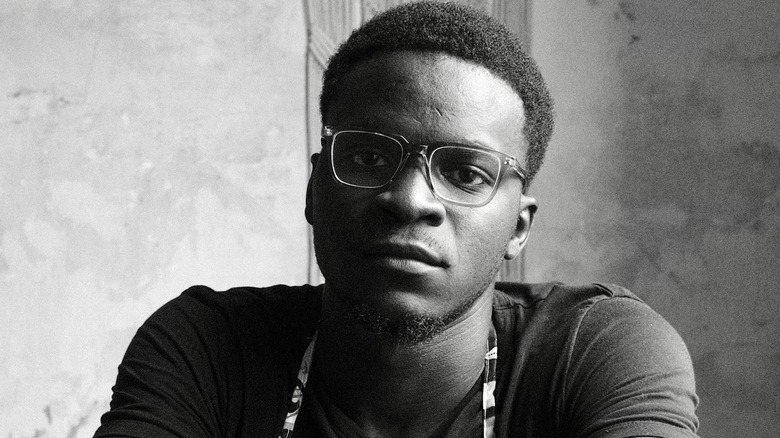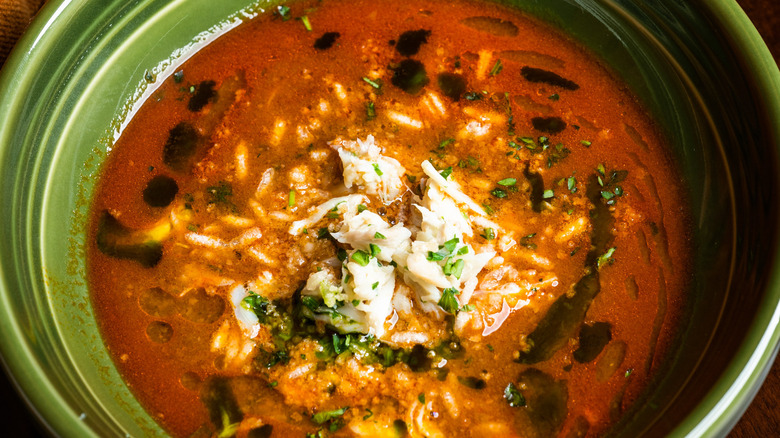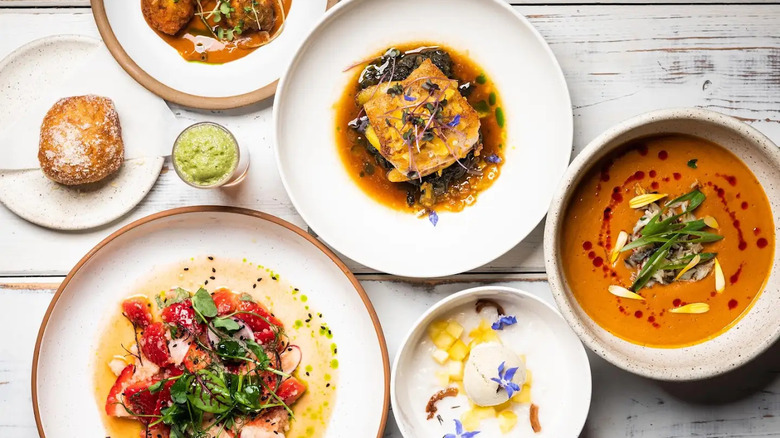Dakar NOLA Explores Black History Through Senegalese Food
With a name like Dakar NOLA, you expect a story waiting in the wings. And indeed there is, one that spans two continents and traverses the U.S. from New York City to San Francisco and New Orleans. It just so happens that this tale, as it continually unfolds at Dakar NOLA restaurant in New Orleans, gets told from plate to plate, fork to mouth, and the mesmerizing linguistics of a young Senegalese chef not yet in his 30s.
Fortunately for diners at Chef Serigne Mbaye's Dakar NOLA, they get a journey through Black history in America while exploring the intricate connections between the foods of Senegambia and those strongly associated with New Orleans, particularly Creole cuisine.
It's a story that's seldom told, but needs to be, according to Chef Mbaye. As he tells Tasting Table, "I am simply shedding light on the African origins of creole cuisine that never get told." After becoming an Emerging Chef finalist in the 2022 James Beard Foundation awards, Mbaye's storytelling voice, through words and food, is likely to be amplified.
Here's what to expect from the tasting-menu experience at Dakar NOLA, and why the restaurant's story is yet another link to the significance of Black history in America.
Last meal, first meal
The cuisine at Dakar NOLA is a modern evolution of dishes from two coastal cities inspiring the restaurant's name: Dakar, the capital of Senegal, and NOLA, a well-known acronym for Louisiana's infamous city of New Orleans. The tasting menu takes guests on a journey that begins with the voyage of African slaves from the shores of Goree Island, near Dakar, which UNESCO calls the largest slave-trading center on Africa's coast from the 1400s through the 1800s.
Chef Mbaye, owner and chef of Dakar NOLA, along with managing partner Effie Richardson, refers to Goree Island as "the door of no return" and explains how the last meal for departing slaves was meant to help them maintain a weight of at least 132 pounds to survive the voyage across the Middle Passage and onward to New Orleans, home to the largest slave market in the United States, per Smithsonian.
Now that "last meal" adds another link to the history of Africans in America. The original black-eyed peas and palm oil that fueled those Senegalese slaves bound for America now reincarnates as "The Last Meal" black-eyed pea soup at Dakar NOLA, made with crispy rice, palm oil, a defining dose of spices, and fresh blue crab from the waters of Louisiana. It jumpstarts the tasting-menu meal, preluding the parade of West African-inspired dishes that follow.
"This was their last meal on African soil and our diners' first meal at Dakar," says Mbaye.
The culinary evolution
Most all the food at Dakar NOLA has roots in Senegalese cuisine. In fact, what we now call New Orleans food, including jambalaya, gumbo, and etouffee, is actually an adaptation from West Africa, explains the chef. "Senegalese food is the grandparent to the cuisine the world has come to love as Creole."
But the dishes, which include intriguing names like Yassa, Fonio salad, and Jerejef, come from a blending of West African food traditions and local Louisiana ingredients, including fresh produce from South Louisiana farmers. It's served to each table in multiple courses – unless you come on Wednesdays, which veers in honor of another West African tradition: family-style meals.
The once-weekly, three-course, pre-fix family-style meals at Dakar NOLA also pay homage to Chef Mbaye's mother, Khady, who he credits with inspiring his food journey. It's a long one, given his young age. Born in New York City and schooled in Senegal, he returned to culinary school in America and eventual immersion in the kitchens of Michelin-starred restaurants in New York and San Francisco.
But Mbaye describes his mother's kitchen in Harlem as equally significant in forming his approach to food. Her home-style cooking, described in the Dakar NOLA Instagram announcement of Wednesday "La Maison de Khady" family meals, has been a comfort for many West African immigrants, far from home, craving traditional Senegalese meals.
Dakar NOLA is open Wednesday through Saturday at 3814 Magazine Street in New Orleans. Reservations are available online or by phone: 504-493-9396.


